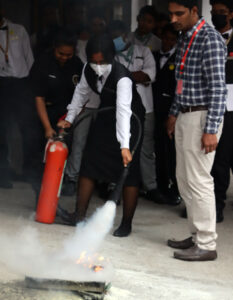Fire Fighting Workshop at top culinary college in Hyderabad
YOU’RE ALWAYS READY, WHEN CALAMITY STRIKES
“He Who Has Saved One Life,
Has Saved The Whole World.”
-K.J. ADAPA
-Accidents occur without any invitation or prior information. And in many cases, most of the people are not aware of what the very crucial steps are that could be taken to prevent, as well as to save ourselves, and others from a potential tragedy.
Being budding hoteliers and future hoteliers, it is very important to know how to deal with unpredictable situations in case of emergencies. Keeping all this in mind, Regency College Of Culinary Arts And Hotel Management, the top college in Hyderabad conducted a “fire fighting” workshop in association with “When-It-Strikes’’ on April 21st 2022 in the college seminar hall.

Fire fighting workshop:
-It’s a life and property safety workshop. This workshop was conducted to show the regents how to deal with fires, what information to give and who to contact during urgency.
The session:
-The speaker of the session was Mr. Ajay Jenuga, an enthusiastic safety trainer from Usha Fire Safety Equipments (P) Ltd.,
Over the course of the session, the regents were shown a PPTconsisting of:
1) Various case studies on fire tragedies across India and how they could’ve been prevented.
2) 9 Steps to become a life saver
“Life saving is the most supreme job on the earth.” To become a life saver in hectic situations whilst contacting emergency services one should give the following information:
- Name
- What type of emergency
- Your mobile number
- Precise pinpointed location
- Type of material burning
- The size of premises
- What is in the premise
- Number of occupants
3) Types of fires: There are 5 types of fires. They are organic fires, fuel fires, electrical fires, kitchen fires, metal fires, etc.
4) Types of fire extinguishers: A, B, C, D, and E.
5) Types of gases released during a fire: Carbon-monoxide, Sulphur dioxide, etc.
6) Methods to stop a fire: Blanketing, Cooling etc.
7) Components of a fire: Fire consists of fuel, oxygen and heat.
9) Types of burns and appropriate treatment of burns
During the session:
-The regents enthusiastically listened to session as well as cooperated with the trainer and his riddle-esque questions. Every point that was said was noted down and etched into the growing minds of the regents for their safety as well as the safety of everyone one else.
Demonstration:
-The extinguishing demo took place in the parking lot of the college where the regents extinguished trial fires at a safe distance successfully. Overall, the workshop was incredibly informative and practical, and fun. Regents acknowledged with the safety systems in the building, fire prevention and the use of fire extinguishers. Henceforth this workshop escalated the significance of emergency preparedness.
BY
Sherlin David
(BCTCA)

